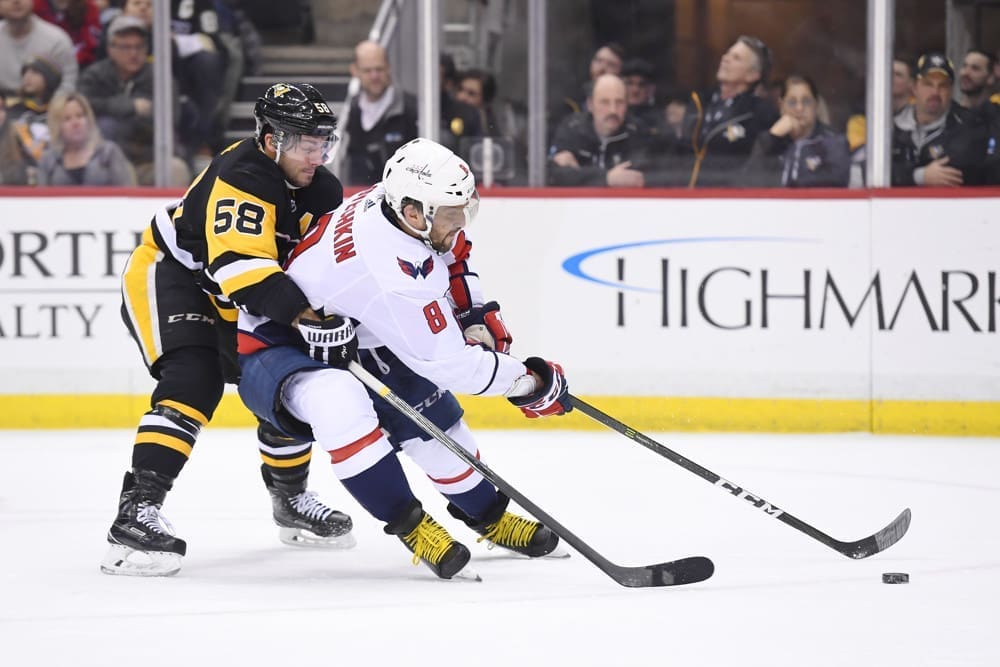Penguins
Penguins Locker Room: Crosby, Letang on Alex Ovechkin’s No-Cup Legacy
Sponsored by Attorney Joshua R. Lamm. Injured? Suspect Medical Malpractice? You Need a Good Attorney

CRANBERRY TOWNSHIP, Pa. — Pittsburgh Hockey Now always wants to be fair. So Tuesday after Penguins practice, we made sure to carefully preface something we asked Sidney Crosby and Kris Letang.
We warned them we were about to ask a loaded question on the eve of a second-round playoff series between the Penguins and Washington Capitals.
That question was: What will it mean for hockey if a player as good and prolific as Alex Ovechkin never wins a Stanley Cup? Their answers in a moment.
Ovechkin will turn 33 before next season, a bit older than Crosby, 30, and Letang, who turned 31 on Tuesday. The Capitals’ super-sniper has 607 goals in 1,003 regular-season games, another 51 goals in 103 postseason games. He just won his seventh Rocket Richard goal title, has won two Hart Trophies as league MVP and beat out Crosby for the Calder Trophy as the top rookie 12 years ago.
An unspoken part of the question about Ovechkin and his zero Cup counter is that the Penguins are at least partly to blame. They have blocked the Capitals’ path to the Eastern Conference final by beating them in the second round three times in the Ovechkin era, including the past two springs, and have gone on themselves to claim the Cup each of those three times.
Neither Crosby nor Letang expressed sympathy for the notion that a sure Hall of Famer such as Ovechkin could miss out on ever winning a Cup – not that they could realistically be expected to.
Letang was more open to the question about Ovechkin’s potential plight.
“At the same time, the other guys that are winning it are making their legacies,” Letang said. “I’m pretty sure if I go down the list, there’s a lot of guys of that caliber that didn’t win a Cup. But he’s still young. He’s still got a lot of juice in the tank.”
Crosby dodged a bit, but he kept within his norm. For all his attention to detail, he usually steers clear of reflection or thoughts on legacies.
“I don’t think that far ahead. I don’t know how to answer that question,” he said.
(Does Pittsburgh Hockey Now get a prize for stumping him?)
Crosby continued:
“He’s an amazing player. Look at what he’s done. But I haven’t thought that far ahead about anybody, including myself. I think we’re all just trying to do our best in the moment and let everyone else judge that stuff. As players, you just try to play.”
And play, they will.
Down to Brass Tacks
Letang could have a little extra to say about the Capitals’ chances in the series. He could often be on the ice at the same time and on the same side of the ice as Ovechkin and his catapult of a shot.
“He’s a pretty big threat out there,” Letang said. “Every time you can do your job against him and do it right, it’s pretty satisfying. He’s really tough. A big task. He’s a big body. He’s physical. He’s got a big shot. You have to reduce his time. You don’t want him to have all kinds of time to release that puck. You try to play him tight.”
It’s unclear how the forwards will be matched, but off the ice Crosby and Ovechkin have been locked in a rivalry — granted, one proliferated by fans and media — since they entered the NHL together. The more their teams meet in the playoffs, the more scrutiny falls on the two team captains.
“I’m not worried about that,” Crosby said. “I think both of us want to win the series.”
In the meantime, the intensity will be cranked once the series starts.
“If you want to win it all, you have to face those big teams,” said Letang, who missed the playoffs last season after having disc surgery on his neck. “The Capitals are the next team that we have in our path. We have to bring our A game. They’re a good team.”
And a familiar one. Crosby said familiarity doesn’t mean nothing changes.
“I think you make subtle adjustments,” he said. “You have to be aware of your opponent, their strengths. Ultimately, you trust your game and try to play your own game, but you’re always aware of who you’re playing and what they do.”












